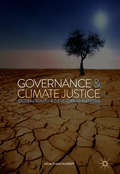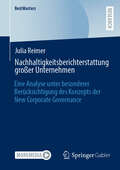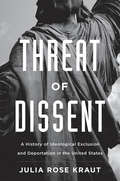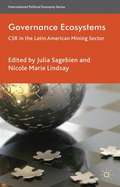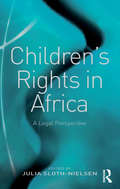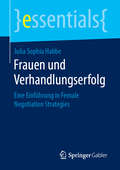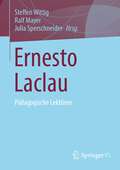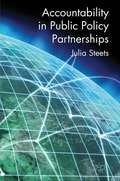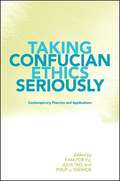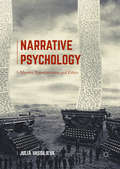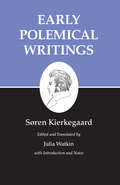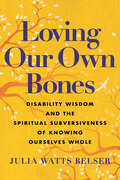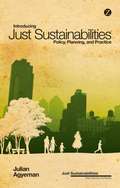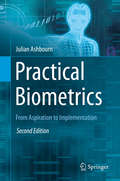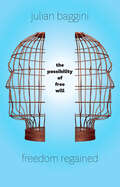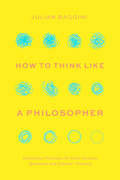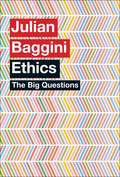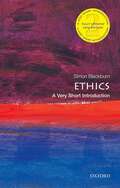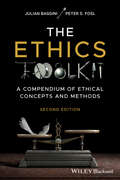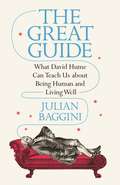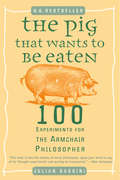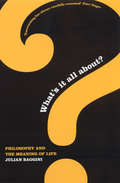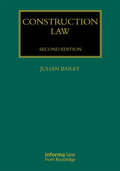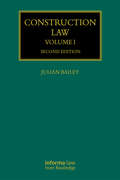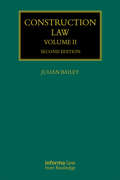- Table View
- List View
Governance & Climate Justice: Global South & Developing Nations (Politics, Economics, And Inclusive Development Ser.)
by Julia PuaschunderThis book examines international climate change mitigation and adaptation regimes with the aim of proposing fair climate stability implementation strategies. Based on the current endeavors to finance climate change mitigation and adaptation around the world, the author introduces a 3-dimensional climate justice approach to share the benefits and burdens of climate change equitably within society, across the globe and over time.
Nachhaltigkeitsberichterstattung großer Unternehmen: Eine Analyse unter besonderer Berücksichtigung des Konzepts der New Corporate Governance (BestMasters)
by Julia ReimerDie ökologische und soziale Verantwortung von Unternehmen ist schon seit Jahrzehnten Thema der Weltpolitik. Die EU stärkte 2023 mit dem Inkrafttreten der Corporate Social Reporting Directive die Bedeutung der nicht-finanziellen Berichterstattung. Auch am Kapitalmarkt steigt das Interesse an nachhaltigen Unternehmen. Die ökonomische, ökologische und die soziale Dimension der unternehmerischen Nachhaltigkeit können jedoch nicht immer in Einklang gebracht werden. Die unternehmerische Realität ist durch Zielkonflikte zwischen den drei Dimensionen geprägt. Die Forschung konnte bisher kaum praktikable Lösungsansätze zum Umgang mit Zielkonflikten in der Praxis entwickeln. Das Konzept der New Corporate Governance könnte eine neue Perspektive bieten. Indem die Zielfunktion der Unternehmen um die sozialen Präferenzen der Shareholder und die externen Auswirkungen der Geschäftstätigkeit erweitert wird, entsteht ein neues Optimierungskalkül für Unternehmensleitung und Aktionäre. Um dabei fundierte Entscheidungen treffen zu können, müssen jedoch Informationen publiziert werden. Die Untersuchung ergründet, inwieweit die aktuelle Nachhaltigkeitsberichterstattungspraxis in Deutschland kompatibel mit den Informationsanforderungen ist, die im Rahmen der New Corporate Governance entstehen.
Threat of Dissent: A History of Ideological Exclusion and Deportation in the United States
by Julia Rose KrautIn this first comprehensive overview of the intersection of immigration law and the First Amendment, a lawyer and historian traces ideological exclusion and deportation in the United States from the Alien Friends Act of 1798 to the evolving policies of the Trump administration. Beginning with the Alien Friends Act of 1798, the United States passed laws in the name of national security to bar or expel foreigners based on their beliefs and associations—although these laws sometimes conflict with First Amendment protections of freedom of speech and association or contradict America’s self-image as a nation of immigrants. The government has continually used ideological exclusions and deportations of noncitizens to suppress dissent and radicalism throughout the twentieth and twenty-first centuries, from the War on Anarchy to the Cold War to the War on Terror. In Threat of Dissent—the first social, political, and legal history of ideological exclusion and deportation in the United States—Julia Rose Kraut delves into the intricacies of major court decisions and legislation without losing sight of the people involved. We follow the cases of immigrants and foreign-born visitors, including activists, scholars, and artists such as Emma Goldman, Ernest Mandel, Carlos Fuentes, Charlie Chaplin, and John Lennon. Kraut also highlights lawyers, including Clarence Darrow and Carol Weiss King, as well as organizations, like the ACLU and PEN America, who challenged the constitutionality of ideological exclusions and deportations under the First Amendment. The Supreme Court, however, frequently interpreted restrictions under immigration law and upheld the government’s authority. By reminding us of the legal vulnerability foreigners face on the basis of their beliefs, expressions, and associations, Kraut calls our attention to the ways that ideological exclusion and deportation reflect fears of subversion and serve as tools of political repression in the United States.
Governance Ecosystems
by Julia Sagebien Nicole Marie LindsayAs debates rage about the responsibilities of business and government in global extractives industries, there remains a significant lack of empirical research and theoretical analysis focused on the dynamics of resource extraction, governance and corporate social responsibility. This collection takes a broad, 'governance ecosystem' view to exploring the complex and cross-cutting relationships between key actors involved in and affected by mining governance in Latin America. Case studies include the Kimberley process over conflict diamonds, the PERCAN Initiative in Peru, the Carajas iron ore complex in the Brazilian Amazon, Apex and Empresa Huanuni in Bolivia, and the gold producers Newmont and Goldcorp. "
Children's Rights in Africa: A Legal Perspective
by Julia Sloth-NielsenThis collection is anchored in an African conception of children's rights and the law, and reflects contemporary discourses taking place in the region of the children's rights sphere. The majority of contributors are African and adopt an individual approach to their topic which reflects their first-hand experience. The book focuses on child rights issues which have particular resonance on the continent and the chapters span themes which are both broad and narrow, containing subject matter which is both theoretical and illuminated by practice. The book profiles recent developments and experiences in furthering children's legal rights in the African context, and distils from these future trends the specific role that the law can play in the African children's rights environment.
Frauen und Verhandlungserfolg: Eine Einführung In Female Negotiation Strategies (Essentials)
by Julia Sophia HabbeTäglich muss jeder von uns verhandeln. Dabei macht es einen Unterschied, ob Männer oder Frauen dies tun. So neigen Frauen dazu, sich mit schlechteren Ergebnissen zufrieden zu geben als Männer. Nach der Forschung lässt sich das mit dem gesellschaftlichen Rollenbild erklären. Wenn Frauen in Konflikten „tough“ auftreten, fürchten sie, ihrem Rollenbild nicht zu entsprechen und negative Gegenreaktionen – zum Beispiel in Form von Sympathieverlust – hervorzurufen (so genannter Backlash-Effekt). Welchen Ausweg gibt es? Dieser Frage geht die genderspezifische Verhandlungsforschung nach. Die Forschungsergebnisse werden in dem vorliegenden essential so vorgestellt, dass sie von jeder Leserin in einer Verhandlungssituation genutzt werden können.Die Autorin Dr. Julia Sophia Habbe ist spezialisiert auf Konfliktlösung, Prozessführung sowie interne Untersuchungen. Sie ist Partnerin einer internationalen Wirtschaftskanzlei in Frankfurt am Main und Lehrbeauftragte der Johann Wolfgang Goethe-Universität im Bereich genderspezifische Verhandlungsführung.
Ernesto Laclau: Pädagogische Lektüren
by Ralf Mayer Steffen Wittig Julia SperschneiderDer Band diskutiert ausgewählte Positionen der Theoriebildung Ernesto Laclaus, die in den letzten Jahren im Kontext demokratietheoretischer Debatten zwar in politik-, kultur- und sozialwissenschaftlichen Feldern rezipiert wurde, deren Aufnahme in erziehungswissenschaftlichen Debatten aber eher als ‚handverlesen‘ bezeichnet werden könnte. Die Rezeption beschränkt sich häufig auf spezifische Einsätze rund um die gemeinsam mit Chantal Mouffe in Hegemonie und radikale Demokratie entwickelte und an Antonio Gramsci ansetzende Hegemonietheorie. Dass Laclaus Perspektiven jedoch eine Vielzahl produktiver Anschlüsse und Irritationen für unterschiedliche pädagogische Frage- und Problemstellungen beinhalten, verdeutlichen die hier versammelten Beiträge rund um transdisziplinäre Spannungsverhältnisse von Politik, Bildung und Pädagogik, von Artikulation und Repräsentation, von Ontologie und Identität oder im Kontext aktueller Sichtweisen auf Inklusion, Solidarität, Migration, pädagogische Beziehungen und Professionalität.
Accountability in Public Policy Partnerships
by Julia SteetsA PDF version of this book is available for free in open access via the OAPEN Library platform, www. oapen. org . This book presents a new model of accountability which ensures that public-private partnerships don't erode public accountability. It defines concrete accountability standards for different types of partnerships.
Taking Confucian Ethics Seriously: Contemporary Theories and Applications (Suny Series in Chinese Philosophy and Culture)
by Philip J. Ivanhoe Julia Tao Kam-Por YuMany—though surely not all—people who have lived in Confucian societies have taken Confucian ethics seriously for hundreds of generations, but why should one study Confucian ethics today?
Narrative Psychology
by Julia VassilievaThis book provides the first comparative analysis of thethree major streams of contemporary narrative psychology as they have beendeveloped in North America, Europe, and Australia and New Zealand. Interrogating the historical and cultural conditions in which this importantmovement in psychology has emerged, the book presents clear, well-structuredcomparisons and critique of the key theories of narrative psychology pioneeredacross the globe. Examples include Dan McAdams in the US and his followers, whohave developed a distinctive approach to self and identity as a life story overthe past two decades; in the Netherlands by Hubert Hermans, whose research onthe 'dialogical self' has made the University of Nijmegen a centre of narrativepsychological research in Europe; and in Australia and New Zealand, where thecollaborative efforts of Michael White and David Epston helped to launch thenarrative movement in psychotherapy in the late 1980s.
Kierkegaard's Writings, I
by Søren Kierkegaard Julia WatkinEarly Polemical Writings covers the young Kierkegaard's works from 1834 through 1838. His authorship begins, as it was destined to end, with polemic. Kierkegaard's first published article touches on the theme of women's emancipation, and the other articles from his student years deal with freedom of the press. Modern readers can see the seeds of Kierkegaard's future career these early pieces. In "From the Papers of One Still Living," his review of Hans Christian Andersen's novel Only a Fiddler, Kierkegaard rejects the notion that environment is decisive in determining the fate of genius. He also puts forward his belief that each person needs a life-view or life for which and by which to live, a thought he explores further in the comic play The Battle between the Old and the New Soap-Cellars.
Loving Our Own Bones: Disability Wisdom and the Spiritual Subversiveness of Knowing Ourselves Whole
by Julia Watts BelserA transformative spiritual companion and deep dive into disability politics that reimagines disability in the Bible and contemporary cultureAn essential read that will foster and enrich conversations about disability, spirituality, and social justice&“What&’s wrong with you?&”Scholar, activist, and rabbi Julia Watts Belser is all too familiar with this question. What&’s wrong isn&’t her wheelchair, though—it&’s exclusion, objectification, pity, and disdain.Our attitudes about disability have such deep cultural roots that we almost forget their sources. But open the Bible and disability is everywhere. Moses believes his stutter renders him unable to answer God&’s call. Jacob&’s encounter with an angel leaves him changed not just spiritually but physically: he gains a limp. For centuries, these stories have been told and retold in ways that treat disability as a metaphor for spiritual incapacity or as a challenge to be overcome.Through fresh and unexpected readings of the Bible, Loving Our Own Bones instead paints a luminous portrait of what it means to be disabled and one of God&’s beloved. Belser delves deep into sacred literature, braiding the insights of disabled, feminist, Black, and queer thinkers with her own experiences as a queer disabled Jewish feminist. She talks back to biblical commentators who traffic in disability stigma and shame. What unfolds is a profound gift of disability wisdom, a radical act of spiritual imagination that can guide us all toward a powerful reckoning with each other and with our bodies.Loving Our Own Bones invites readers to claim the power and promise of spiritual dissent, and to nourish their own souls through the revolutionary art of radical self-love.
Introducing Just Sustainabilities: Policy, Planning, and Practice
by Julian AgyemanThis unique and insightful text offers an exploration of the origins and subsequent development of the concept of just sustainability.
Practical Biometrics
by Julian AshbournThis practically-focused text presents a hands-on guide to making biometric technology work in real-life scenarios. Extensively revised and updated, this new edition takes a fresh look at what it takes to integrate biometrics into wider applications. An emphasis is placed on the importance of a complete understanding of the broader scenario, covering technical, human and implementation factors. This understanding may then be exercised through interactive chapters dealing with educational software utilities and the BANTAM Program Manager. Features: provides a concise introduction to biometrics; examines both technical issues and human factors; highlights the importance of a broad understanding of biometric technology implementation from both a technical and operational perspective; reviews a selection of freely available utilities including the BANTAM Program Manager; considers the logical next steps on the path from aspiration to implementation, and looks towards the future use of biometrics in context.
Freedom Regained: The Possibility of Free Will
by Julian Baggini“For anyone who has ever given serious thought to the degree to which our actions are within our own control, Freedom Regained will give you a lot to chew on.” —Spectrum CultureIt’s a question that’s puzzled philosophers and theologians for centuries and is at the heart of numerous political, social, and personal concerns: Do we have free will? In this cogent, compelling book, Julian Baggini explores the concept of free will from every angle, blending philosophy, sociology, and cognitive science to find rich new insights on the intractable questions that plague us. Are we products of our culture, or free agents within it? Are our neural pathways fixed early on by a mix of nature and nurture, or is the possibility of comprehensive, intentional psychological change always open to us? And what, exactly, are we talking about when we talk about “freedom” anyway?Freedom Regained brings the issues raised by the possibilities—and denials—of free will to thought-provoking life, drawing on scientific research and fascinating encounters with everyone from artists to prisoners to dissidents. Baggini looks at what it means to be material beings in a universe of natural laws. He asks if there’s any difference between ourselves and the brains from which we seem never able to escape. He throws down the wild cards and plays them to the fullest: What about art? What about addiction? What about twins? And he asks, of course, what this all means for politics.Ultimately, Baggini challenges those who think free will is an illusion. Moving from doubt to optimism to a hedged acceptance of free will, he ultimately lands on a satisfying conclusion: It is something we earn. The result is a highly engaging, new, and more positive understanding of our sense of personal freedom, a freedom that is definitely worth having.“Entertaining.” —The Wall Street Journal“While firmly rooted in the philosophical tradition, Baggini also gets out and talks to people for whom freedom—and lack of it—is a real and pressing matter.” —Literary Review
How to Think like a Philosopher: Twelve Key Principles for More Humane, Balanced, and Rational Thinking
by Julian BagginiAn invitation to the habits of good thinking from philosopher Julian Baggini. By now, it should be clear: in the face of disinformation and disaster, we cannot hot take, life hack, or meme our way to a better future. But how should we respond instead? In How to Think like a Philosopher, Julian Baggini turns to the study of reason itself for practical solutions to this question, inspired by our most eminent philosophers, past and present. Baggini offers twelve key principles for a more humane, balanced, and rational approach to thinking: pay attention; question everything (including your questions); watch your steps; follow the facts; watch your language; be eclectic; be a psychologist; know what matters; lose your ego; think for yourself, not by yourself; only connect; and don’t give up. Each chapter is chockful of real-world examples showing these principles at work—from the discovery of penicillin to the fight for trans rights—and how they lead to more thoughtful conclusions. More than a book of tips and tricks (or ways to be insufferably clever at parties), How to Think like a Philosopher is an invitation to develop the habits of good reasoning that our world desperately needs.
The Big Questions: Ethics
by Julian Baggini'The Big Questions' series is designed to let renowned experts confront the 20 most fundamental and frequently asked questions of a major branch of science or philosophy. In 'The Big Questions: Ethics' Julian Baggini, one of Britain's best-known philosophers, condenses complex, contemporary issues of right and wrong into 20 key questions. He examines how we can start to answer them, what they might mean to us and how they influence the way we choose to live our lives. Among the ideas debated are: What is free will? Can it ever be right to kill? Is terrorism ever justified? Should euthanasia be legal? Are some people superior to others? Do animals have rights?
The Ethics Toolkit: A Compendium Of Ethical Concepts And Methods
by Julian Baggini Peter S. FoslThe Ethics Toolkit provides an accessible and engaging compendium of concepts, theories, and strategies that encourage students and advanced readers to think critically about ethics so that they can engage intelligently in ethical study, thought, and debate. Written by the authors of the popular The Philosophers' Toolkit (Blackwell, 2001); Baggini is also a renowned print and broadcast journalist, and a prolific author of popular philosophy books Uses clear and accessible language appropriate for use both inside and beyond the classroom Enlivened through the use of real-world and hypothetical examples Cross-referencing of entries helps to connect and contrast ideas Features lists of prominent ethics organizations and useful websites Encourages readers to think critically about ethics and teaches them how to engage intelligently in ethical study, thought, and debate
The Ethics Toolkit: A Compendium of Ethical Concepts and Methods
by Julian Baggini Peter S. FoslA new edition of the bestselling guide which equips readers with the skills necessary for engaging in ethical reflection The Ethics Toolkit offers an engaging and approachable introduction to the core concepts, principles, and methods of contemporary ethics. Explaining to students and general readers how to think critically about ethics and actually use philosophical concepts, this innovative volume provides the tools and knowledge required to engage intelligently in ethical study, deliberation, and debate. Invaluable as both a complete guide and a handy reference, this versatile resource provides clear and authoritative information on a diverse range of topics, from fundamental concepts and major ethical frameworks to contemporary critiques and ongoing debates. Throughout the text, Fosl and Baggini highlight the crucial role ethics plays in our lives, exploring autonomy, free will, consciousness, fairness, responsibility, consent, intersectionality, sex and gender, and much more. Substantially revised and expanded, the second edition of The Ethics Toolkit contains a wealth of new entries, new recommended readings, more detailed textual references, and numerous timely real-world and hypothetical examples. Uses clear and accessible language appropriate for use inside and beyond the classroom Contains cross-referenced entries to help readers connect and contrast ideas Engages both non-Western and Western philosophy Offer insights into key issues in ethics with a firm grounding in the history of philosophy Includes an appendix of tools for the practice of ethics, including links to podcasts, web and print resources, and prominent ethics organizations Written by the authors of the popular The Philosophers’ Toolkit, this new edition of The Ethics Toolkit is a must-have resource for anyone interested in ethics, from general readers to undergraduate and graduate students.
The Great Guide: What David Hume Can Teach Us about Being Human and Living Well
by Julian BagginiInvaluable wisdom on living a good life from one of the Enlightenment's greatest philosophersDavid Hume (1711–1776) is perhaps best known for his ideas about cause and effect and his criticisms of religion, but he is rarely thought of as a philosopher with practical wisdom to offer. Yet Hume's philosophy is grounded in an honest assessment of nature—human nature in particular. The Great Guide is an engaging and eye-opening account of how Hume's thought should serve as the basis for a complete approach to life.In this enthralling book, Julian Baggini masterfully interweaves biography with intellectual history and philosophy to give us a complete vision of Hume's guide to life. He follows Hume on his life's journey, literally walking in the great philosopher's footsteps as Baggini takes readers to the places that inspired Hume the most, from his family estate near the Scottish border to Paris, where, as an older man, he was warmly embraced by French society. Baggini shows how Hume put his philosophy into practice in a life that blended reason and passion, study and leisure, and relaxation and enjoyment.The Great Guide includes 145 Humean maxims for living well, on topics ranging from the meaning of success and the value of travel to friendship, facing death, identity, and the importance of leisure. This book shows how life is far richer with Hume as your guide.
The Pig That Wants to Be Eaten
by Julian BagginiThe author presents 100 thought experiments, and invites the reader to think about possible answers. Experiments cover identity,religion, art, ethics, language, knowledge and many more. Baggini offers some ways of approaching each problem.
What's It All About?: Philosophy & the Meaning of Life
by Julian Baggini&“Secular-minded readers seeking an alternative to The Purpose-Driven Life have an excellent starting point here.&”—Publishers Weekly For readers who are serious about confronting the big issues in life—but are turned off by books which deal with them through religion, spirituality, or psychobabble, this is an honest, intelligent discussion by a philosopher that doesn't hide from the difficulties or make undeliverable promises. It aims to help the reader understand the overlooked issues behind the obvious questions, and shows how philosophy does not so much answer them as help provide us with the resources to answer them for ourselves. &“Useful and provocative.&”—The Wall Street Journal &“Looking for a clear guide to what contemporary philosophy has to say about the meaning of life? Baggini takes us through all the plausible answers, weaving together Kierkegaard, John Stuart Mill, Monty Python, and Funkadelic in an entertaining but always carefully reasoned discussion.&”—Peter Singer, author of How Are We To Live &“The question of the meaning of life has long been a byword for pretentious rambling. It takes some nerve to tackle it in a brisk and no-nonsense fashion.&”—New Statesman
Construction Law: A Festschrift For Lord Justice Jackson (Construction Practice Series)
by Julian BaileyNow in its second edition, Construction Law is the standard work of reference for busy construction law practitioners, and it will support lawyers in their contentious and non-contentious practices worldwide. Published in three volumes, it is the most comprehensive text on this subject, and provides a unique and invaluable comparative, multi-jurisdictional approach. This book has been described by Lord Justice Jackson as a "tour de force", and by His Honour Humphrey LLoyd QC as "seminal" and "definitive". This new edition builds on that strong foundation and has been fully updated to include extensive references to very latest case law, as well as changes to statutes and regulations. The laws of Hong Kong and Singapore are also now covered in detail, in addition to those of England and Australia. Practitioners, as well as interested academics and post-graduate students, will all find this book to be an invaluable guide to the many facets of construction law.
Construction Law: Volume I (Construction Practice Series)
by Julian BaileyNow in its second edition, Construction Law is the standard work of reference for busy construction law practitioners, and it will support lawyers in their contentious and non-contentious practices worldwide. Published in three volumes, it is the most comprehensive text on this subject, and provides a unique and invaluable comparative, multi-jurisdictional approach. This book has been described by Lord Justice Jackson as a "tour de force", and by His Honour Humphrey LLoyd QC as "seminal" and "definitive". This new edition builds on that strong foundation and has been fully updated to include extensive references to very latest case law, as well as changes to statutes and regulations. The laws of Hong Kong and Singapore are also now covered in detail, in addition to those of England and Australia. Practitioners, as well as interested academics and post-graduate students, will all find this book to be an invaluable guide to the many facets of construction law.
Construction Law: Volume II (Construction Practice Series)
by Julian BaileyNow in its second edition, Construction Law is the standard work of reference for busy construction law practitioners, and it will support lawyers in their contentious and non-contentious practices worldwide. Published in three volumes, it is the most comprehensive text on this subject, and provides a unique and invaluable comparative, multi-jurisdictional approach. This book has been described by Lord Justice Jackson as a "tour de force", and by His Honour Humphrey LLoyd QC as "seminal" and "definitive". This new edition builds on that strong foundation and has been fully updated to include extensive references to very latest case law, as well as changes to statutes and regulations. The laws of Hong Kong and Singapore are also now covered in detail, in addition to those of England and Australia. Practitioners, as well as interested academics and post-graduate students, will all find this book to be an invaluable guide to the many facets of construction law.
